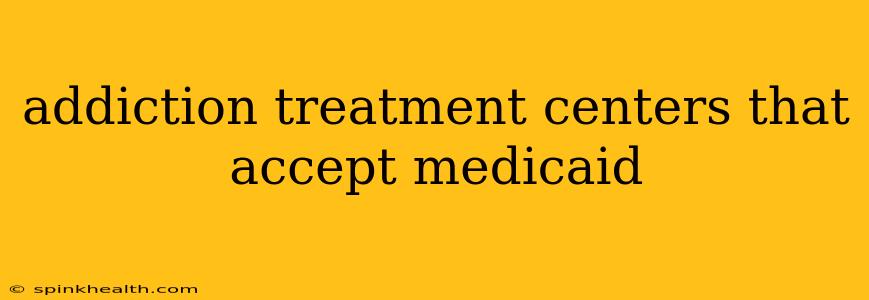Finding Addiction Treatment Centers That Accept Medicaid: A Journey to Recovery
The road to recovery from addiction is challenging, but finding the right support can make all the difference. For many, financial constraints represent a significant hurdle in accessing vital treatment. This is where understanding how Medicaid can help becomes crucial. Medicaid, a government-funded health insurance program, can provide coverage for substance abuse treatment in many states, opening doors to recovery for those who might otherwise struggle to afford it. This article will guide you through the process of finding addiction treatment centers that accept Medicaid.
This journey isn't always easy. It involves navigating various resources, understanding eligibility requirements, and knowing where to look for reliable information. Let's explore this together.
What is Medicaid and How Does it Cover Addiction Treatment?
Medicaid is a joint federal and state program that provides healthcare coverage to millions of low-income Americans. Eligibility requirements vary by state, but generally include factors like income, household size, and citizenship status. Crucially, many Medicaid programs cover substance use disorder (SUD) treatment, including detoxification, inpatient rehab, outpatient therapy, and medication-assisted treatment (MAT). The extent of coverage can differ between states and individual plans.
How Can I Find Addiction Treatment Centers That Accept Medicaid in My Area?
Finding a facility that accepts your specific Medicaid plan can feel like searching for a needle in a haystack. Here’s a breakdown of effective strategies:
-
Your State's Medicaid Office: This is your primary resource. Their website or a phone call will provide you with a list of providers in your area that participate in your Medicaid plan. This is the most accurate and up-to-date information available.
-
SAMHSA's National Helpline: The Substance Abuse and Mental Health Services Administration (SAMHSA) offers a 24/7 confidential helpline (1-800-662-HELP (4357)). Their trained professionals can provide referrals to treatment facilities and help navigate the complexities of insurance coverage, including Medicaid.
-
Online Directories: Several online directories specialize in listing treatment centers and their insurance acceptance. Be cautious, though, and always verify the information with the facility and your Medicaid provider.
-
Local Hospitals and Clinics: Your local hospital or community health clinic may have a list of affiliated addiction treatment centers, some of which accept Medicaid.
What Types of Addiction Treatment Are Covered by Medicaid?
Medicaid coverage for addiction treatment is not uniform across all states. However, many programs cover a range of services, including:
- Detoxification: The medically supervised process of safely withdrawing from substances.
- Inpatient Rehabilitation: Residential treatment programs providing 24/7 care in a structured setting.
- Outpatient Treatment: Less intensive programs offering therapy and support services without requiring residential stay.
- Medication-Assisted Treatment (MAT): Using medications like methadone, buprenorphine, or naltrexone in conjunction with therapy to treat opioid and alcohol addiction.
- Behavioral Therapy: Individual and group therapy to address underlying issues contributing to addiction.
What if My Medicaid Doesn't Cover the Treatment I Need?
Even if your Medicaid plan doesn't fully cover the specific treatment you require, there are options to explore:
- Appeals Process: You might be able to appeal the denial of coverage if you believe it's unjustified.
- Financial Assistance Programs: Many treatment centers offer financial assistance programs or sliding fee scales to help patients manage costs.
- Non-Profit Organizations: Several non-profit organizations provide financial assistance for addiction treatment.
What questions should I ask a treatment center before committing?
Before committing to a treatment center, it is crucial to ask the following questions:
- Do you accept my specific Medicaid plan? This is paramount. Verbal confirmation is not enough; you need written documentation.
- What types of treatment do you offer? Ensure the center provides the services that best suit your needs.
- What are your success rates? While not a guaranteed predictor of individual outcomes, success rates offer a glimpse of a facility's effectiveness.
- What is included in the cost of treatment? Understand what is and isn't covered by Medicaid.
Finding the right addiction treatment center can be a journey, but with careful planning and the right resources, you can find the path to recovery. Remember, seeking help is a courageous first step, and there are resources available to support you. Your health and well-being are paramount.

